
Recently on Cyclingnews.com |
An interview with Oleg Tinkov, December 19, 2008
Brewing over cycling exit
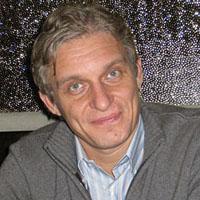
|
Oleg Tinkov is leaving cycling and the team he funded for the last two years Tinkoff Credit Systems. The Russian businessman met Cyclingnews' Gregor Brown to explain why he will not be continuing in 2009 with Team Katusha.
Oleg Tinkov developed his Continental team into a well-established Professional Continental Team, Tinkoff Credit Systems, at the end of 2006. The Italy-based, Russia-funded team gained numerous victories, including two stages in the Giro d'Italia. The team announced midway through this season that it would expand with the help of new sponsors and be known as Team Katusha for 2009.
Igor Makarov's Itera backs the new team with additional funding from sponsors Gazprom and Rostechnologii. With the budget of 15 to 20 million Euro, it signed several key riders to bolster its ranks Australian Robbie McEwen, Belgian Gert Steegmans, Italian Filippo Pozzato, Russians Vladimir Karpets and Alexandre Botcharov. The signing of former top professional Andrei Tchmil as general director in July did not make sense in Tinkov's eyes. The two tried to work side-by-side, but Tinkov decided to leave his loved sport in September.
Cyclingnews: You developed team Tinkoff Restaurants to Tinkoff
Credit Systems and now, as the team takes another step up, you are leaving.
How did this all come about?
Oleg Tinkov: I basically transferred my team, Tinkoff Credit Systems,
to Katusha. Igor Makarov, the head of Itera company, owns it. He used to be
a good track cyclist. He is like me, but much more rich!
"I believe that all the wages for the riders should go down 30 or 40 percent."- Oleg Tinkov expects the credit crunch to reach rider's wages |
We talked at the Giro, he said he liked our team and it would be a good idea [to take over Tinkoff]. We signed the deal in May and we agreed I would be the president and he would pay the bills. For some reason during the Tour de France he said his old friend Andrea Tchmil would like to be involved and he wanted him to be there. I said 'why do we need two captains on one boat, when there are two captains the boat does not go anywhere?'.
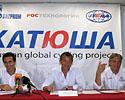
|
CN: Makarov signed Tchmil, though. Then what happened?
OT: I tried to make it work with Andrei Tchmil. I am a president and
he has not had any title, but just a representative figure, so it was a complicated
a situation. For me cycling is, was and always will be a passion, an emotion.
I was running the team and not making any money. For Andrea Tchmil cycling is
a business and I am sure he would like to make some money on this deal. We just
didn't get along.
My goal was not to make money, but to build the best Russian team. Like Team Astana for Kazakhstan, I want to have a Russian team win the Giro and eventually the Tour de France. I don't care about money; I spent my own seven million Euro for three years.
I went back to Makarov in September and said it really won't work and you have to decide who is going to run the team. It a lot of politics there are a lot of people behind Makarov and Tchmil had his role in the Moldavia government, but I am a straightforward businessman.
I was not forced to leave. No one said 'you have to go'.
Business behind TinkovOleg Tinkov's main business is banking institution Tinkoff Credit Systems, which he started as his team debuted in the Giro d'Italia in May, 2007. "We have five-percent of the Russian market and we have issued 300,000 [credit] cards and we have 200-million dollar balance now. It is a direct-mail model, similar to Capital One. We send you like 20 million letters a year. To give you an example, we are the biggest client of the Russian postal system." Tinkov first made his money in the beer industry, becoming Russia's fourth largest brewer with lines such as Tinkoff Zolotoe. He also owns 12 restaurants that each have a microbrewery inside. |
CN: Do you still talk with Tchmil?
OT: I have not talked with him in a couple of months, I think in September.
He is just a manager; I never was a manager, but the owner of a business. He
is a great cyclist, but he is a very poor sports manager and sports director.
CN: Is it better to have someone like Bob Stapleton, who is not a past
cyclist, in the sport?
OT: I think that is better. For instance, I brought in to cycling [general
manager] Stefano Feltrin. He was a lawyer for my company and I brought him into
the business and everyone started to laugh. Now, for the three years that he
has been running the show, I think he is qualified and he is running Katusha.
Cycling needs these types of people, like me.
Former cyclists, they are people from the same loop. What is he [Tchmil] doing? He brings in [directeur sportif] Serge Parsani; he is basically starting to bring all of his friends into the team. I said, 'Andrei, that is not what you want to do, you want to get the best people out of the market, not your friends'.
He wants to make sure he controls the situation, the money. I am a believer in the Anglo-Saxon model, where I am sure that Australian teams, American teams and United Kingdom teams are going to emerge, or even German. Their model is based on the business model, instead of the manage model. The French, Italian and Spanish teams, it is more like 'friends, friends'.
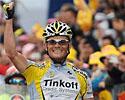
|
CN: Who made the decisions to sign the new riders for Katusha?
OT: All the signings were both of our [with Tchmil - ed.] decisions until
the end of September. I was not involved with the signings of [Danilo] Napolitano
and [Laszlo] Bodrogi. It was good, Ridley [bikes], Pozzato, Steegmans, Karpets,
Botcharov. Karpets and Botcharov came to the team because of me, and they are
pissed off now that I left.
CN: Is it true what some media reported, that Katusha was offering lucrative
contracts to riders?
OT: We did not buy anyone at a crazy price. That is why we did not buy
[Denis] Menchov. It was an obvious choice for the team he is Russian, he can
win the Tour or Giro but we did not buy him because he wanted two million
Euro. I said, 'No, it is not your price. It is fine if you want to join for
1.2 [million Euro]'.
Now we have this crisis, I believe that all the wages for the riders should go down 30 or 40 percent. I am from the business side, and believe me, I know what is going on the other side of the road there is no money. Next year you will see lots of sponsors pull out. Lots will pull out or they will decrease their expenses. There is no way this guy is going to drive a Ferrari or nice cars. They look fine now, because the contracts were signed one or two years ago.
CN: Is it your dream is to return to the cycling world?
OT: My dream was, is and will be to have a Russian national [team] win
the Tour de France once, to be on the Champs-Ιlysιes [in Paris] with the Russian
flag waving. I will come back in three, four, five or maybe eight years and
we might have someone from Russia able to win. If my business is able to allow
me I would like to have my own, big team.
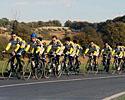
|
CN: Do you have any regrets from the last three years?
OT: I don't regret the moment that I came into cycling. Every day out
of the three years I enjoyed. My wife will kill me [for what I spent]. I got
a lot of experience and if I come back I know what I have to do and what
the right approach is.
CN: What were the high points?
OT: When we won stages in the Giro. When Pavel Brutt won his first ever
stage for Tinkoff Credit Systems. Then [Vasil] Kiryienka won the second stage,
that was quite emotional for me. That was cool.
What we Omar Piscina, Dmitri Konyshev, Feltrin, Orlando Maini, Claudio Cozi achieved in the last two years was amazing. We participated in major events with a relatively small budget. We went to both Grand Tours Vuelta and Giro we went to the Tour of Qatar, Tour of Malaysia, Paris-Roubaix, [Milano-] Sanremo, Tour of Flanders...
I wanted to go to two races: Tour of California and the Tour de France. I wanted to go to the Tour of California because I have a house in San Francisco and I spent six years there, my kids went to the schools. I am passionate about it and I want to bring my team there. I have a lot of cycling friends there and I have done about 15,000 to 20,000 kilometres [of riding] there.
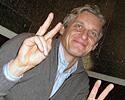
|
CN: Did the doping scandals help you make the decision to leave the
sport?
OT: Partially, it did. When the turbulent time started and I was talking
to Makarov, I was uncertain about my future, and partly what helped was [the
cases of Bernard] Kohl, [Stefan] Schumacher. When that started to roll out I
said, 'Okay, maybe it is enough'.
It is getting better, though, with the cleansing. It helps, even if is very strict and aggressive. The reason Tinkoff did not win a lot this year is simply because I am sure my guys at least the Russian guys are clean.
CN: How can you be sure they are all clean?
OT: Because I know how they trained, what ground they came from. Maybe
they would like to, don't get me wrong, but they don't know how to. It is expensive,
they don't know the stuff and they did not have the money. Eventually they may.
Ignatiev, Trusov, Kiryienka...if you ask about Tinkoff Credit Systems, I am
99-percent certain they were clean. I did not mention some Italians, Spanish
or Germans that were in my team.
You look at an amateur team in Italy, which I won't name. The team wins a lot, they are all 18 to 20 [years old], they win a lot in 2006, but obviously they have been doping. Unfortunately, that is the culture, they all want to become professionals and they use a lot a s**t and that is simply because they can afford it. The UCI pushes the biological passports and ProTour teams, but I would rather see [Pat] McQuaid spend his money on the amateur teams. That is where all the s**t starts, that is where they learn how to do it. They want to become professional and they want to earn big money. When they are 18 and they want to drive a BMW, the only way they can do is to sign a contract with a big team, but they feel they have to dope that is the problem that exists.
CN: At the end of 2007, you tried to fill you team with only young Russians?
OT: In a way we did it. We did not renew a lot of people. It is not about
specific nations, Italy or Russia, it is more about the Eastern Bloc cyclists
not having the money or the culture. In Italy you have the preparatore
or the so-called doctors, in Russia there are no doctors or preparatore.
Maybe in five years time it will be the same, when they have more money. It
Italy, the preparatore and doctors teach them [the riders - ed.] how
and what to do, because they want to make money too.
Related articles:
January 24, 2007: Tinkoff presented amongst cycling dignitaries
September 2, 2008:Katusha aims big for 2009
Photography
For a thumbnail gallery of these images, click here
Images by Gregor Brown
- Tinkoff Credit Systems owner Oleg Tinkov told Cyclingnews why his time in cycling had to come to an end.
- Businessman Oleg Tinkov knows he will return to cycling one day.
Images by Roberto Bettini/www.bettiniphoto.net
- The Tinkoff Credit Systems team training in 2006.
Images by AFP Photo
- Vasili Kiryienka (Tinkoff Credit Systems) rides to his team's second stage victory of the Giro d'Italia.
Images by Tinkoff Credit Systems
- Stefano Feltrin, Andrei Tchmil and Oleg Tinkov discuss their plans for 2009.
